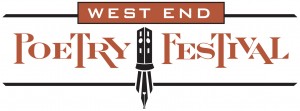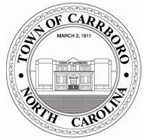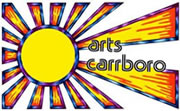 The 2014 West End Poetry Festival is coming up on October 17 and 18, and, as both a participant and an organizer, I’m excited about this festival, funded by the arts-hip Town of Carrboro.
The 2014 West End Poetry Festival is coming up on October 17 and 18, and, as both a participant and an organizer, I’m excited about this festival, funded by the arts-hip Town of Carrboro.
Participating poets represent a wide range of poets—different styles, different points in their careers, different places in their lives. The West End Poetry Festival can boast both James Applewhite with a dozen poetry titles to his credit (the first published in 1975, the most recent this year—a 40-year spread) and spoken-word poet Kamaya Truitt-Martin, a sophomore at North Carolina Agricultural and Technical State University.
While Triangle area poets are well represented in the festival line-up, Sharon Nyree Williams is making her way to the festival from Seattle, and Sarah Rose Nordgren, whose Best Bones (University of Pittsburgh Press, 2014) won the Starrett Prize for Poetry, is coming from Cincinnati.
I could say wonderful things about the work of all the participating poets—but poetry is better experienced than summarized, so I hope to see you at at least part of this free festival, which kicks off Friday, October 17, with a reception and readings by James Applewhite, Ross White, Sarah Rose Nordgren, David Roderick, and Charmaine Cadeau, 6:30 to 8:30 pm at Flyleaf Books in Chapel Hill.
The festival continues Saturday, October 18, noon to 8:30 pm at the Century Center in Carrboro, with an open workshop on form and its uses (even for free-verse poets), an experiential workshop for middle-school-age and high-school-age poets, panel sessions on poetry and place, an open mic, a reception, and a final reading featuring Cathy Smith Bowers, poet laureate of North Carolina from 2010 to 2012. Saturday poets include Cathy Smith Bowers, Laurence Avery, Pam Baggett, Steve Cushman, Tyree Daye, Ann Deagon, Terri Kirby Erickson, Dave Manning, Joseph Mills, Gary Phillips, Sacrificial Poets, Alana Sherrill, Susan Spalt, Celisa Steele, Chris Tonelli, Kamaya Truitt-Martin, and Sharon Nyree Williams.
For more, check out the full 2014 West End Poetry schedule and poet bios (PDFs).
And, last but not least, here’s a poem from Cathy Smith Bowers, who will read at the final event of the 2014 West End Poetry Festival.
A Southern Rhetoric
by Cathy Smith Bowers
“It’s a sight in this world
the things in this world
there are to see!” my mother says
as she hurries between the stove
and Sunday table. She is just back
from vacation. Happy.
Talking mountains. Talking rivers.
Big cedars and tidal bores.
When I tease her for redundancy,
her face glows like a sturgeon moon
risen above fat buttery atolls
of biscuits, steaming promontory
of roast. She shakes her finger
in my face and scolds me good:
“Girl, don’t you forget who it was
learned you to talk.”
Amazing she would want
to lay claim to these syllables
piling up like railroad salvage
when I speak, to these words slow as hooves
dredging from the wet of just-plowed fields.
I watch her turn, embarrassed, to the sink,
to the pots and pans she will scrub
to a gleam so bright we can see ourselves
as if the two of us stared back
from the lost rhetoric of memory.
From the little house, the crib where
she bent each day, naming
for me the world where words always fail,
warranting, now and then,
those few extra syllables,
some things spoken twice.

 As Carrboro poet laureate, I was invited to read a poem last night at the swearing-in ceremony of Carrboro’s new mayor, Lydia Lavelle, and re-elected alderpersons Jacquelyn Gist, Randee Haven-O’Donnell, and Sammy Slade at Carrboro Town Hall.
As Carrboro poet laureate, I was invited to read a poem last night at the swearing-in ceremony of Carrboro’s new mayor, Lydia Lavelle, and re-elected alderpersons Jacquelyn Gist, Randee Haven-O’Donnell, and Sammy Slade at Carrboro Town Hall. I’m pleased to announce I’m the new Carrboro Poet Laureate. My term starts immediately and lasts through June 2015.
I’m pleased to announce I’m the new Carrboro Poet Laureate. My term starts immediately and lasts through June 2015.